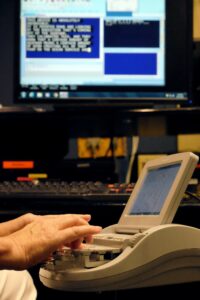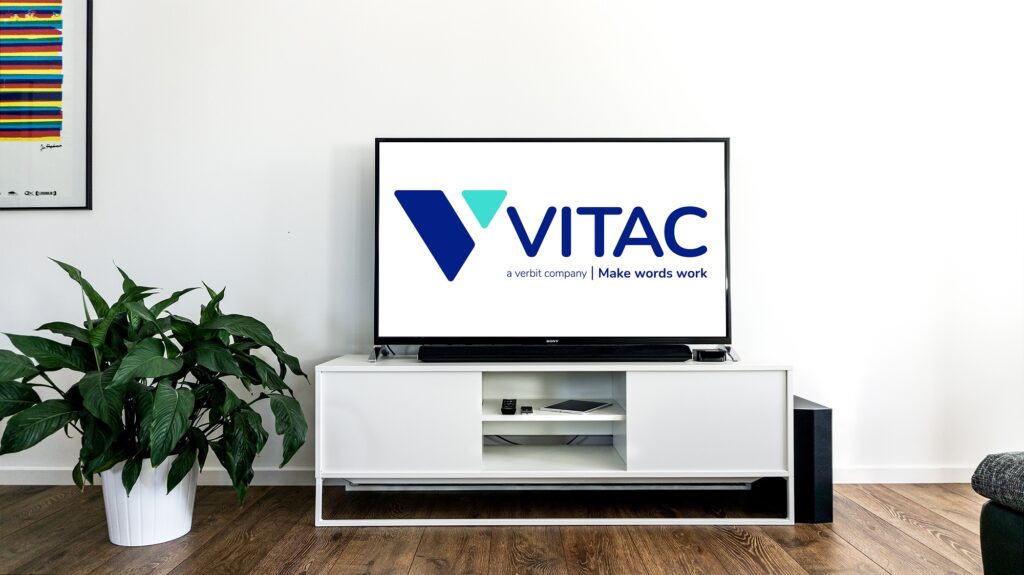Awards season is in full swing with Golden Globes and Critics Choice awards already sitting on celebrity shelves, while the Screen Actors Guild, Oscar, and Grammy awards will be handed out in the coming weeks.
And just as it takes a crew of directors, stage producers, and set designers to put on a successful awards show, so, too, does it take a skilled team of production coordinators, schedulers, and captioners to bring high-quality captions to these shows, making them accessible to a wider audience.
VITAC realtime captioner Lee Bursten is no stranger to award shows, and knows firsthand the amount of planning, preparation, and research that goes into captioning such events.
Research, Research, Research
“Award shows are usually a more involved and hectic experience due to so many different factors,” Lee says. “The captioner needs to stay calm and focused.”
One of the most challenging parts of captioning an awards show is the amount of research that needs to be done in advance of the broadcast − compiling lists of nominees, movie or show titles, character names, or songs to have ready at your fingertips.
“When prepping for awards shows, the first thing I do is Google the show name and try to find lists of the categories, nominees, and presenters,” he says. “For large events like the Oscars or the Golden Globes, the names of the presenters are finalized well in advance and are easy to find. For other events, the list of presenters is sometimes in flux so I may have to keep searching on the day of the event to find the latest media news or gossip sites that may have updated lists.”
If the event has musical numbers, Lee will research what songs are expected to be performed, and have the lyrics on hand during the show so that he can more accurately write them while they’re sung.
Updating the Dictionary
 “Once I have my lists of categories, nominees, and presenters, I print them out and make sure I can write them all,” he says. “After starting a realtime file on my steno machine and computer, I add any unusual first names into a temporary job dictionary, so that if someone says just the first name, it will come out spelled correctly.
“Once I have my lists of categories, nominees, and presenters, I print them out and make sure I can write them all,” he says. “After starting a realtime file on my steno machine and computer, I add any unusual first names into a temporary job dictionary, so that if someone says just the first name, it will come out spelled correctly.
“I’ll make sure the full names, first and last together, are in my permanent personal dictionary, since they’re all public figures whose names may very well come up for me in the future, and I’ll also make up brief forms (abbreviated steno strokes) for any names and titles that are exceptionally long or awkward to write.
“For example, I take my steno stroke for the word ‘once’ and write it twice, and I have that defined as [Oscar-nominated film] ‘Once Upon a Time in Hollywood,’ with quote marks. I have my own code that I use to remind myself of what my briefs are. On my printed-out list, I’ll circle the word ‘Once’ in ‘Once Upon a Time in Hollywood’ and I know that means to write that syllable twice to get the whole title.
“When I’ve gone through the list and done all the defining I need to do, I then, with my realtime file still open, write the entire list of names two or three times to make sure I’ve defined everything correctly and haven’t forgotten any. The other benefit to writing the entire list several times is that I get familiar with the names and how I write them. During the show, I may need to write some of the names without having time to find those names on my list, so the more familiarity I have with the names, the better.”
Scripts and Prep Materials
VITAC production coordinators and schedulers work alongside captioners to help prepare for the shows, setting up proper connections and testing those pathways with the broadcaster to ensure captions at the start of the show.
“Usually before the show I’ll receive a fully prepared and formatted script from the production folks at VITAC HQ,” Lee says. “Having the script is great because it means I can simply feed the lines of script without having to write on my steno machine. The big caveat here is that the script won’t necessarily reflect exactly what happens on the live show, so I need to be ready to write on my steno machine at any moment, if they deviate from the script.
“For one thing, the script will say, ‘And the winner is –’ and then leave a blank, since obviously our client doesn’t yet know, at the time they send the script, who the winner will be. For that reason alone, I still need to do a full prep so that I can write the name of the winner as it’s said live. Also, of course, thank-you speeches by the winners won’t be in the script so I’ll need to write those live as well.
“Another reason I can’t completely rely on the script is that the show’s producers are making changes to the script and the order of the segments right up to the time the show starts, and even after the show starts they may truncate various segments due to time limitations. So I really need to be ready to start writing live on my steno machine at any moment, and I may need to write for as long as 15 or 20 minutes before I have an opportunity (usually during a commercial) to search around in the script so I can get back on track with it.”
Preparing for the Unexpected
And as any captioner on a live program or event knows, you need to be ready for any surprises or, as was the case with this year’s Golden Globes, any, ahem, colorful language. (We’re looking in your direction, Ricky Gervais.)
“For this year’s Golden Globes, Ricky Gervais’ words were often muted by the network for obscenity, which is an interesting experience for the captioner,” Lee says. “The captioner suddenly hears silence, as does the viewer, but for the captioner it’s a bit alarming as the first thing that comes to mind is that something is wrong with our equipment or internet access or phone lines. Each time it happened, after I realized that the host was being muted, I put up a [ Muted ] parenthetical for the captions.”
(Interested in learning more? Click here for a look at the work that VITAC production coordinators do in bringing captions to award shows.)




